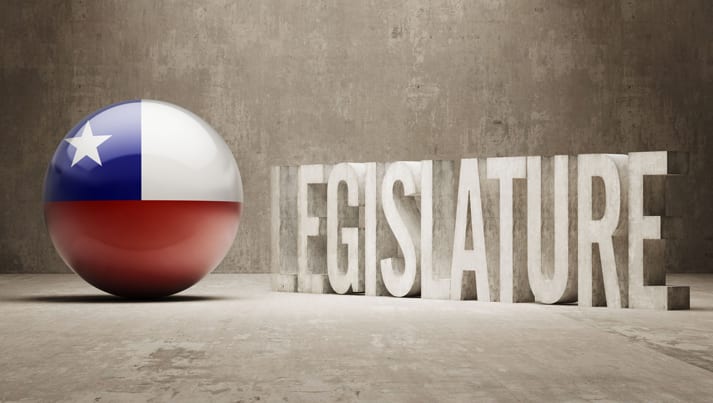Chile Looks Forward

A promising piece of legislation could ease one of the world’s most extreme abortion bans.
This past March, a 25-year-old woman suffering from terrible abdominal pain and vaginal bleeding sought emergency care at the hospital—where she was reported to authorities and detained on suspicion of attempted abortion.
If this story feels unnervingly familiar, that’s probably because you’ve heard something like it before. In countries such as El Salvador or Nicaragua, where extreme bans prohibit abortion even in cases of rape or to save a woman’s life, women are as a result often criminalized for miscarriage and other pregnancy loss.
In particular, the world has come to know the stories of Las 17, a group of women in El Salvador. After experiencing tragic pregnancy complications, each was convicted of homicide and imprisoned under that country’s total abortion ban.
But last month’s arrest comes out of Chile, a country that otherwise boasts a worldly sensibility, with relatively low maternal mortality rates and a strong health care system.
Due to an extreme ban implemented in the final years of the brutal Pinochet dictatorship almost 25 years ago, Chile is one of only four countries in the world that expressly prohibits abortion under any circumstances.
The majority of women arrested for suspected abortion in Chile are reported by doctors, who can avoid prosecution for their involvement if they report the act. As a result, many women do not to seek medical help in the event of an attempted abortion gone wrong.
“This young woman’s arrest highlights just how out of step Chile’s current policy is with the country’s own social priorities—and even with the rest of Latin America, where we are seeing some of the more conservative governments are starting to enact change,” says Mónica Arango, regional director for Latin America and the Caribbean at the Center for Reproductive Rights.
For more than a decade, the Center has been active in high-level legal and human rights efforts in two prominent international treaty bodies—the Inter-American Commission on Human Rights and the United Nations Committee on the Elimination of Discrimination Against Women—to expose how the region’s extreme abortion bans compromise women’s health and safety. Our ongoing efforts in countries such as El Salvador, Brazil, and the Dominican Republic have brought a perceptible shift to Latin American policies toward abortion access and rights, as well as maternal health in general.
At last, a groundbreaking bill—introduced in February by Chile’s president, Michelle Bachelet, a pediatrician—promises an easing of that country’s outdated abortion policy, with four notable exceptions to the ban: in cases of life endangerment, health endangerment, rape, or fetal abnormality.
While the legislation is a historic step toward decriminalizing abortion in Chile, the proposed law would require authorization from two medical professionals and only allow women to access an abortion legally within the first 12 weeks of pregnancy.
“This bill is long overdue, and there is no question that it will ultimately be successful,” says Arango. “Chile is a modern country with a strong history of caring for the health of its vulnerable citizens. It is past time to liberalize this backwards policy that inflicts harm and infringes on the dignity of Chilean women.”
Illegal abortion rates are difficult to estimate, but likely range from 15,000 to 200,000 a year in Chile. As in other countries like El Salvador, poorer women are forced to carry out clandestine and unsafe abortions—risking hemorrhage, death, and legal punishment—while wealthier women can often travel or attain the procedure with less risk to their health and freedom.
The bill is now being debated by the Commission of Health in Chile’s House of Representatives, who could vote on the new policy this month. Then the bill will be passed to the Senate, where it is likely to encounter more significant opposition.
While there is wide public support for the proposed reforms, particularly around the life and health endangerment exceptions, the issue of a rape exception continues to provoke heated debate. In segments of Chile—South America’s most Catholic country—there remains a sense that it is courageous for a woman to carry to term a pregnancy caused by rape. This infamous argument was popularized in 2013 by then president Sebastián Piñera, who praised an 11-year-old girl who continued a pregnancy following two years of rape by her mother’s boyfriend, for her “depth and maturity.”
The Center’s advocacy in the region remains focused on fighting for the passage of all of the proposed exceptions, where these changes—at a very minimum—are needed to protect women’s health. As the bill is debated in the Chilean congress, we are providing technical assistance to advocates on the ground and held a panel discussion this month to elevate the debate inside and outside of Congress on international law and public health topics related to the bill.
“At their heart, the exceptions included in this bill are essential human rights—insuring a women’s right to health, dignity, and self-determination,” says Arango. “We will not relent until Chile enacts legislation that protects these basic rights—already acknowledged by an overwhelming majority of the world’s nations—for its own citizens.”
